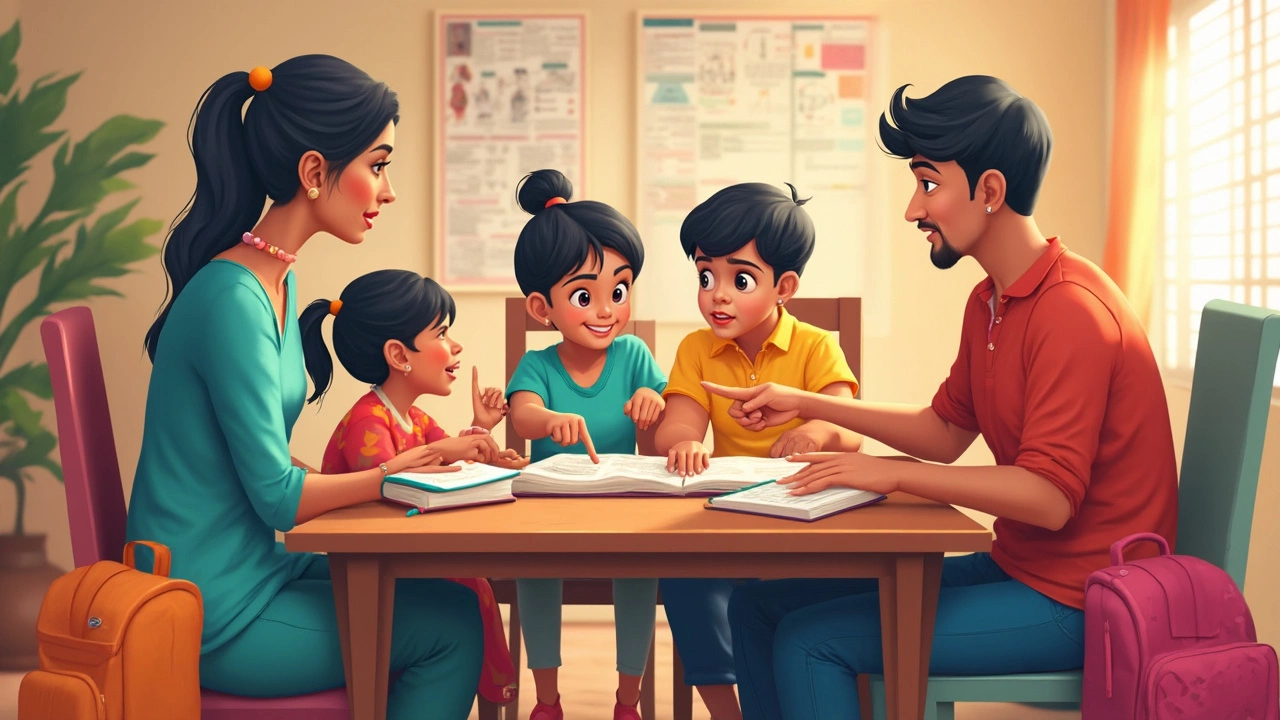Choosing the right syllabus for CBSE is a huge decision. If you’re a parent or student, you’ve probably heard friends debating CBSE, ICSE, or state boards over chai. But when it comes to real benefits, what actually sets the CBSE syllabus apart?
For starters, CBSE is like the gold standard for competitive exams in India. If your child wants to crack JEE, NEET, or even go abroad for studies, the CBSE pattern lines up perfectly. That’s not just marketing fluff—most entrance exams literally use CBSE textbooks for their questions.
Textbooks follow the NCERT guidelines, which means less confusion for students flipping through resources. Teachers often say that CBSE makes tough ideas seem more doable, especially in math and science. Not just that, the focus isn’t cramming info, but understanding the concepts so students can actually solve problems—not just recite them. You know those surprise questions in board exams? If you understand the CBSE approach, you can handle them without freezing up.
- CBSE Syllabus: What Makes It Unique?
- CBSE vs. Other Popular Syllabuses
- How Colleges and Jobs View Different Syllabuses
- CBSE Syllabus and Student Creativity
- Tips to Get the Best Out of the CBSE Syllabus
- Real Experiences: What Students and Parents Say
CBSE Syllabus: What Makes It Unique?
The CBSE syllabus stands out for two big reasons: it’s super structured, and it goes hand-in-hand with most big entrance exams in India. The Central Board of Secondary Education (CBSE) works under the Government of India, so it keeps things updated and in sync with what colleges and employers want.
Take a look at how the CBSE system is built:
- NCERT textbooks form the core—almost all subjects follow these, which means what you learn is actually what you’re tested on.
- The syllabus is streamlined—no overloaded chapters or weirdly tough topics that show up just to confuse everyone.
- There’s a proper balance of theory and practicals, especially in science streams. Lab sessions, projects, and hands-on work get decent weight rather than just being a formality.
- Skill-based questions are a norm now. About 40% of paper weight in some grades comes from application and analysis questions, not just rote learning.
- CBSE refreshes its syllabus every few years, so you don’t get stuck with outdated topics (like that guy still using a 2009 phone).
The real kicker? More than 21,000 schools in India and abroad follow CBSE. That’s a massive network, so if your family ever needs to move, your kid’s studies won’t take a hit. There’s built-in flexibility.
If you’re aiming for engineering or medical fields, here’s a quick comparison:
| Board | Alignment with Entrance Exams | Ease of Finding Resources |
|---|---|---|
| CBSE | Exact Match | Easy (lots of NCERT-based material) |
| ICSE | Partial | Decent, but less direct |
| State Boards | Varies by state | Not uniform; tough if moving states |
So, if you want something curriculum-based, country-wide, and future-proof, CBSE syllabus fits the bill better than most options out there.
CBSE vs. Other Popular Syllabuses
So how does the CBSE syllabus really stack up against ICSE, state boards, and international syllabuses? People usually look for the practical stuff—like which board is better for exams, career, and everyday school life.
CBSE syllabus focuses more on building strong basics, especially in science and math. The exam pattern is clearer, with straightforward questions and a lot of weight given to logic and reasoning. If your child is aiming for engineering or medical, CBSE is honestly the most direct route because competitive exams like JEE and NEET are set mainly from NCERT and CBSE materials.
ICSE, on the other hand, does deep dives into subjects—more topics, and a bigger stress on English. Yes, ICSE board will make you write more essays and give you some extra grammar drills. State boards stick close to their regional roots and may use local languages, but sometimes lag behind on the latest updates to the curriculum.
- CBSE syllabus: Standardized, less pressure to write huge essays, great for exams like JEE/NEET
- ICSE: More subjects, tougher English, lots of internal assessment (think projects and lab work)
- State Boards: Regional focus, sometimes less rigorous unless you’re in a top state like Tamil Nadu or Maharashtra
- International boards (IB, Cambridge): Critical thinking and global skills, but not always aligned with Indian entrance exams
Check out this quick comparison to see what matters most.
| Board | Exam Focus | Subject Depth | Language |
|---|---|---|---|
| CBSE | JEE, NEET, NDA, central jobs | Good in math/science, balanced | Hindi & English |
| ICSE | CET, more private options | High, especially languages | Strong in English |
| State Boards | State entrance, some national | Varies state-to-state | Often local + English/Hindi |
| IB/Cambridge | International/abroad | Very high, all-round | English |
If you switch schools or might move around India, CBSE syllabus is safer—it’s the same across all CBSE schools countrywide. ICSE and state boards sometimes have different textbooks or grading, so you could end up a bit lost.
End of the day, ask yourself: does your child want to focus on entrance exams, develop language skills, or maybe move abroad? Each syllabus has its own flavor. But if “best” means widely accepted and practical for competitive exams, CBSE syllabus is tough to beat.
How Colleges and Jobs View Different Syllabuses
Ever hear someone say colleges only care about marks? It goes deeper than that. In India, most national colleges and employers know the CBSE syllabus front to back. When you apply for places like Delhi University, IITs, or engineering colleges, their entrance exams and admission process tilt toward CBSE’s way of doing things.
Here’s why: entrance tests like JEE, NEET, CUET, and even a lot of government job exams use the same NCERT materials and format that CBSE students study. It’s not favoritism—it’s just practicality. If you’re already studying from those books and following that system, you’re usually a step ahead.
Internationally, CBSE isn’t a mystery either. Universities in the US, Canada, and Australia have seen thousands of CBSE report cards. If you’ve taken standardized tests like the SAT or ACT, you might find the CBSE math and science prep lines up pretty nicely. A 2024 survey by QS World University Rankings found CBSE students made up about 30% of all Indian undergraduate admissions to top 200 global universities.
| Board | Preferred for | Common Exams Aligned |
|---|---|---|
| CBSE | Central universities, JEE, NEET, Government jobs | JEE, NEET, CUET, NDA |
| ICSE | Arts, Language-centric programs | Board specific, not national exams |
| State Boards | State colleges | State-level entrance exams |
Employers look at your overall profile, but if you want a government job or want to write national competitive exams, the CBSE way matches their question style and marking schemes almost exactly.
Dr. Anamika Srivastava, an admissions officer at a top engineering college, sums it up like this:
“We see students from all boards, but those from the CBSE syllabus usually navigate entrance exams and the first year’s coursework with less stress. The concepts translate well into real college demands.”
So, if you’ve got your eyes set on standardized exams or big-name universities—CBSE gives you a pretty handy head start.

CBSE Syllabus and Student Creativity
There’s this idea floating around that the CBSE syllabus is just about memorizing facts. That’s not really true anymore. Over the last few years, CBSE has mixed things up to make sure students get more creative, not just good at exams. Take a look at the newer NCERT books—they’re packed with activities, simple projects, and case studies, all meant to spark real thinking instead of just copying from the blackboard.
The latest exam patterns now include more application-based and analytical questions. In other words, it’s not enough to just spit back what’s in the book. You’ve got to think for yourself and solve problems, which is a much bigger test of creativity than the old rote learning ways.
Here’s something cool: in 2023, over 60% of the questions in CBSE Class 10 and 12 board exams were competency-based, meaning they checked for real understanding, creative explanation, and not just straight memory. That’s a major shift from five years ago, when it used to be about 30-35%.
| Year | % Creative/Application Questions |
|---|---|
| 2019 | 35% |
| 2021 | 50% |
| 2023 | 61% |
CBSE schools are also being nudged to offer fun assignments—think group projects, easy research work, and simple debates. This approach helps kids pick up skills they’ll actually need later, like teamwork and speaking up with their own ideas.
- Classroom activities often include role-plays and interviews.
- Art-integration is now part of social science and math, so students learn by drawing, designing, and not just reading.
- Assignments sometimes ask you to research your own neighborhood, turning boring textbook stuff into real stories.
If your kid is the type who asks questions or likes coming up with new solutions, the best syllabus for CBSE lets them do just that. Sure, some schools are better than others at supporting creativity, but the base CBSE structure is finally moving in the right direction.
Tips to Get the Best Out of the CBSE Syllabus
If you want to really shine with the CBSE syllabus, there are some simple habits that actually make a difference. It’s not about memorizing every word—it’s about doing smart work, not just hard work.
First up, don’t skip NCERT books. The majority of questions in board exams and competitive entrance tests (like NEET and JEE) come almost straight out of NCERT textbooks. Teachers always say: finish your NCERTs before jumping into any guidebooks or extra practice material.
- Practice old question papers. Try at least 5-10 years’ worth. You’ll spot repeated questions and understand the pattern. The CBSE board doesn’t try to trick you—they want to see if you get the concepts.
- Make short notes while you read. Bullet points actually work better than big paragraphs. When exams get close, these notes save you a ton of time.
- Use diagrams and flowcharts. Science and social studies answers stand out when you add visuals. CBSE loves neat, well-structured answers with supporting diagrams—for some questions, you even score more.
- Don’t ignore sample papers. Every year, CBSE itself releases sample papers. Solve them under real test timings.
- Group study can help, if you can stay on track. Explaining concepts to a friend is the best way to check if you’re actually clear on the topic.
If you’re aiming for entrance exams, keep your CBSE basics tight first, then move to advanced books. Stats show students who build a strong base with CBSE books score higher in NEET and JEE prelims. Here’s some quick data from a recent coaching center survey:
| Exam | CBSE Syllabus Coverage in Questions (%) |
|---|---|
| NEET 2024 | 78% |
| JEE Main 2024 | 72% |
| CUET 2024 | 85% |
CBSE posts detailed marking schemes every year. These aren’t just for examiners—they show straight-up what gets marks and what doesn’t. Download and check these before writing big answers.
Keep an eye on changes each year. CBSE tweaks its syllabus now and then (like reducing portions during special circumstances), so don’t just follow what seniors did blindly. Always check latest updates on the official website.
Last tip—don’t get lost in tuition and extra classes. Use them if you need help, but stick to your base plan. Work from your CBSE textbook up. That’s almost always the winning approach.
Real Experiences: What Students and Parents Say
You get the real scoop on the CBSE syllabus when you listen to the people actually living it—students and parents. The pattern here is clear: CBSE makes it easier for kids to gear up for big competitive exams, but people have their fair share of complaints too.
For example, Ravi, a Class 12 student from Delhi, says, “Because my school followed the standard NCERT books closely, I didn’t have to scramble for extra reference material when preparing for NEET. My friends from other boards were playing catch-up.” That’s a huge advantage if you’re looking at engineering or medical entrance tests. A lot of parents chime in with something similar: the CBSE syllabus is well-aligned with India’s most popular higher education entrance exams.
But it’s not all smooth sailing. Meera, whose son switched from State board to CBSE in Grade 9, points out, “The pace is fast and can overwhelm kids who aren’t strong in English or who join late. We had to get a tutor just to catch up at first.”
Many parents love the focus on conceptual clarity over rote memorization. They notice their kids can solve problems in new ways, not just write textbook answers. This comes in handy when surprise questions show up. But they note that CBSE is not famous for sports or arts—schools usually prioritize academics, so creative kids might need extra activities outside of school.
One thing almost everyone mentions? The annual exam stress. CBSE board exams are infamous for making tenth and twelfth graders feel the heat. But the students who understand the exam pattern say they feel confident, especially when using practice papers and mock tests.
Take a look at how students feel about their preparedness for entrance exams when comparing boards:
| Board | Feeling Prepared for JEE/NEET (%) |
|---|---|
| CBSE | 78 |
| ICSE | 46 |
| State Boards | 35 |
One Bengaluru parent said it simply: "If your child’s target is an Indian competitive exam, the CBSE syllabus cuts out a lot of confusion. But if you want all-round development, you’ve got to seek it outside class."


